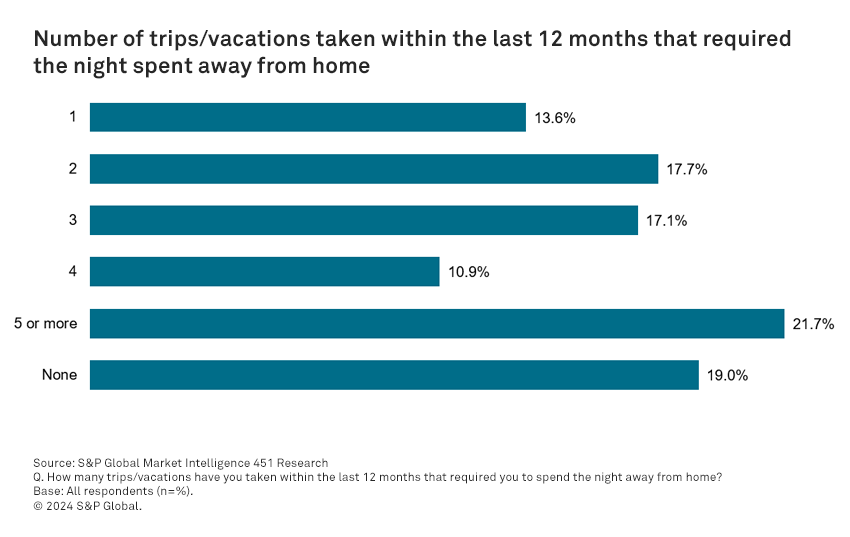
The new Retirement & Lifestyle Trends survey series focuses on the experiences of retired and near-retired respondents from our Leading Indicator sample to better understand the attitudes, habits and spending patterns of this economic group when it comes to technology, leisure, finance and related products/services. The Travel & Hobbies 2023 iteration of the survey focuses specifically on savings strategies for travel as well as the current usage of digital platforms for travel planning.
The Take
Travel is a key component of retired life. Not only is it the top activity retirees have more time for, but it also offers a wide variety of options in terms of where to go, how to get there and how to plan a trip. Retirees are comfortable making travel arrangements themselves, often directly with the airlines and hotels they plan to use, which also happens to be one of the most efficient ways to collect and redeem travel rewards. Online travel booking sites are rarely used by retirees and have exceptionally low satisfaction ratings among those who have used them.
Summary of findings
Retirees take three trips a year on average and prefer to book trips themselves. The survey asked retirees how many trips they have taken within the last 12 months. While the highest percentages were for five or more (21%) and zero (20%), responses across the whole group average out to 3.24 trips over the preceding 12 months. When planning for trips, three-quarters (75%) say they made the travel arrangements themselves. Only 5% used a travel agent.

Similarly, when asked how they generally make their travel plans, 72% say they booked directly with the provider (e.g., airline, hotel). Another 43% say they used an online booking website/app. The overlap across these groups indicates that while most retires prefer to work directly with a specific hotel, airline or car rental agency, some retirees are also open to using other methods if it works best for their trip.
Retired travelers most prefer car trips and travel rewards. Respondents said road trips (48%) were their primary mode of travel, followed by airplanes (41%). This lines up with the number of respondents saying they use more affordable modes of travel (e.g., driving instead of flying) (33%) to save money when traveling. With that said, the number one way to save money on trips is by using travel rewards (46%). Other key saving strategies include booking far in advance (34%), using online travel websites (30%) and staying with family or friends (28%).
Booking websites are underutilized. With a majority of retirees preferring to book travel themselves directly with the hotel or airline, where does that leave travel websites? For air travel, Expedia (21%) and Kayak (13%) stand out as the only sites with double-digit usage. The hotel/lodging landscape on the other hand is much more competitive with Expedia (19%), Hotels.com (16%), Booking.com (15%) and Airbnb (13%) all reaching double digits. Furthermore, car rentals follow the same pattern with Enterprise, Avis Budget and Hertz garnering the largest shares, and Expedia (10%) standing out as the most used booking website. In fact, Expedia is not only the most used booking website, it is the only one to garner double-digit usage across all three aspects of travel planning. These results are not exactly surprising as this age group reports being less tech savvy and preferring to take a hands-on approach to travel planning. Considering that, it makes the number of respondents who said they use Airbnb to book lodging noteworthy.
Abysmal satisfaction with booking websites is a key reason retirees prefer not to use them. Among the most used booking websites, Booking.com (20%) has the most respondents saying they are very satisfied with the service, followed by Expedia (18%), Hotels.com (17%) and Kayak (17%). These satisfaction rates are roughly three times lower, on average, when compared with consumer electronics products such as smartphones. Airbnb again bucks this trend among retirees with a noticeably higher satisfaction rating even though the overall usage of the service is lower than the others listed above.
Travel rewards play a big role in travel arrangement decisions. Another big reason retirees prefer to work directly with airlines, hotels and car rental agencies are the travel and loyalty rewards each offers. Airline loyalty/frequent flyer programs (62%) and hotel rewards programs (47%) are cited as two of the top three ways respondents earn travel rewards, along with credit cards points/rewards (60%). Online travel website loyalty programs are much further down at only 10%. While online travel websites do offer convenience and competitive pricing, they clearly lag in their ability to offer compelling and competitive reward programs that rival well-established channels like credit card rewards and airline/hotel frequent flyer programs. In fact, the top two strategies retirees use to earn travel rewards are through using their credit cards (71%) and booking directly with the travel provider (54%).
Besides travel, how do retirees spend their time? The survey finds that only 13% of retired respondents say they had done any work-for-pay over the previous 12 months. Among this group, traditional employment (42%) and consulting within their areas of expertise (40%) are by far the most common. Wanting something to do, earning additional income and pursuing a hobby/interest are the main reasons respondents say they continued to work during retirement.
When asked which hobbies they are able to pursue more often since retiring, respondents cite traveling (55%), investing (54%) and reading (50%) as their top activities. Wellness activities (43%) also rate highly. Beyond these activities, the hobbies retirees participate in are not particularly different from those of people in other age groups, such as watching movies or TV shows, outdoor activities and volunteering.

